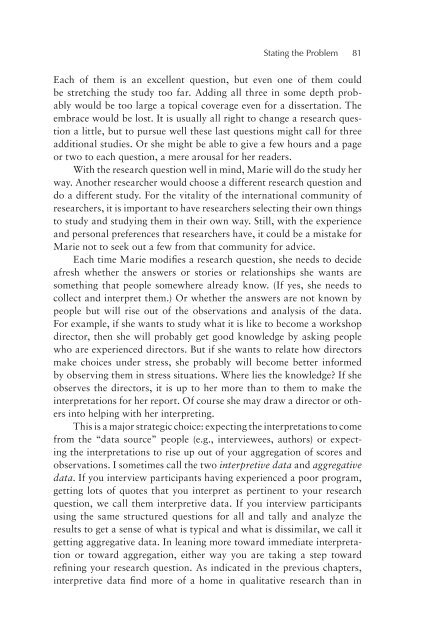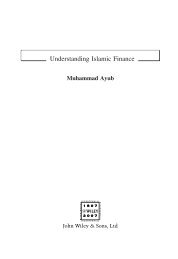How Things Work - Doha Academy of Tertiary Studies
How Things Work - Doha Academy of Tertiary Studies
How Things Work - Doha Academy of Tertiary Studies
You also want an ePaper? Increase the reach of your titles
YUMPU automatically turns print PDFs into web optimized ePapers that Google loves.
Stating the Problem 81<br />
Each <strong>of</strong> them is an excellent question, but even one <strong>of</strong> them could<br />
be stretching the study too far. Adding all three in some depth probably<br />
would be too large a topical coverage even for a dissertation. The<br />
embrace would be lost. It is usually all right to change a research question<br />
a little, but to pursue well these last questions might call for three<br />
additional studies. Or she might be able to give a few hours and a page<br />
or two to each question, a mere arousal for her readers.<br />
With the research question well in mind, Marie will do the study her<br />
way. Another researcher would choose a different research question and<br />
do a different study. For the vitality <strong>of</strong> the international community <strong>of</strong><br />
researchers, it is important to have researchers selecting their own things<br />
to study and studying them in their own way. Still, with the experience<br />
and personal preferences that researchers have, it could be a mistake for<br />
Marie not to seek out a few from that community for advice.<br />
Each time Marie modifies a research question, she needs to decide<br />
afresh whether the answers or stories or relationships she wants are<br />
something that people somewhere already know. (If yes, she needs to<br />
collect and interpret them.) Or whether the answers are not known by<br />
people but will rise out <strong>of</strong> the observations and analysis <strong>of</strong> the data.<br />
For example, if she wants to study what it is like to become a workshop<br />
director, then she will probably get good knowledge by asking people<br />
who are experienced directors. But if she wants to relate how directors<br />
make choices under stress, she probably will become better informed<br />
by observing them in stress situations. Where lies the knowledge? If she<br />
observes the directors, it is up to her more than to them to make the<br />
interpretations for her report. Of course she may draw a director or others<br />
into helping with her interpreting.<br />
This is a major strategic choice: expecting the interpretations to come<br />
from the “data source” people (e.g., interviewees, authors) or expecting<br />
the interpretations to rise up out <strong>of</strong> your aggregation <strong>of</strong> scores and<br />
observations. I sometimes call the two interpretive data and aggregative<br />
data. If you interview participants having experienced a poor program,<br />
getting lots <strong>of</strong> quotes that you interpret as pertinent to your research<br />
question, we call them interpretive data. If you interview participants<br />
using the same structured questions for all and tally and analyze the<br />
results to get a sense <strong>of</strong> what is typical and what is dissimilar, we call it<br />
getting aggregative data. In leaning more toward immediate interpretation<br />
or toward aggregation, either way you are taking a step toward<br />
refining your research question. As indicated in the previous chapters,<br />
interpretive data find more <strong>of</strong> a home in qualitative research than in

















